Africa Internet Governance Forum: highlights from IFLA’s Sub-Saharan Regional Division representatives
19 August 2022
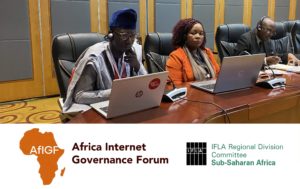
Libraries were well represented at the Africa Internet Governance Forum by IFLA’s Sub-Saharan Africa Region Committee members and stakeholders, who in partnership with the Malawi Library Association participated at the event held between 19 and 22 July 2022, in Lilongwe, Malawi.
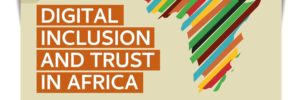
The Eleventh Annual Meeting of the Africa Internet Governance Forum (AfIGF) was hosted by the Government of Malawi under the overarching theme of Digital Inclusion and Trust in Africa. The program was built around the four main thematic tracks
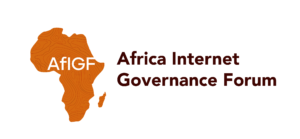 Affordable and meaningful access
Affordable and meaningful access- Cybersecurity, privacy, and personal data protection
- Digital skills & human capacity development
- Digital infrastructure
These are all areas close to libraries, pointing to the essential role of our institutions, and the need for us to engage in internet governance fora. The relationship is a close one – libraries depend on the internet to provide equitable access to information for all, but in turn, can play a huge part in providing digital access to resources and closing digital divide in Africa, as we look to build back better from the global pandemic.
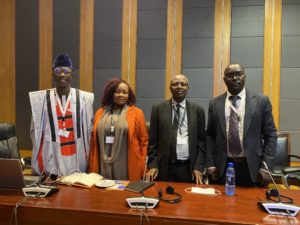 At the forum, IFLA’s Sub-Saharan Africa Regional Division Committee (SSA RDC), in partnership with Malawi Library Association, organised a side event advocating to and strategically engaging stakeholders on the role of libraries in ensuring a sustainable and inclusive digital society.
At the forum, IFLA’s Sub-Saharan Africa Regional Division Committee (SSA RDC), in partnership with Malawi Library Association, organised a side event advocating to and strategically engaging stakeholders on the role of libraries in ensuring a sustainable and inclusive digital society.
During the side event, titled Navigating the truth amidst turbulences in the virtual space, the invited speakers shared insights into the critical evaluation of digital information, how to promote ethical engagement online, and how to build awareness of the public about the key issues in the digital space.
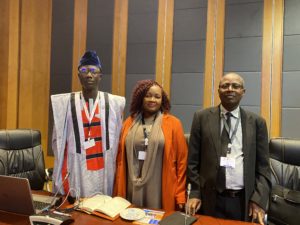
The session was moderated by Damilare Oyedele, Co-founder and Chief Executive of Library Aid Africa, with speakers Felix Patrick Majawa, Associate Professor, University Librarian for the Mzuzu University, Malawi, and Bongiwe Magocha, Head of Library and information services at the Botswana Accountancy College. They dived extensively into impact on communities of using the of Internet in providing library services and the need for critical evaluation of digital information. They also discussed the importance of promoting ethical engagement online, and building awareness for the public about the key issues in the digital space.
The representatives of IFLA’s Sub-Saharan Africa Regional Division touched on many important issues regarding the impact of the global pandemic. It was noted that navigating a virtual space has been a challenging issue for society, as we increasingly depend on technology for everything we do. The global pandemic created the need for more virtual interaction and virtual spaces to share ideas, communicate and work, and with it, the skills to do this ethically, skillfully, and confidently.
The session further communicated and shared learnings about information and digital literacy basics. Sharing context into the below key questions was a highlight:
- What does Information Literacy mean?
- How can society harness Information and Digital literacy (and affordable access) to power meaningful use of the Internet for social and economic benefits?
During the session, through experience sharing by the speakers, participants learnt about the need to evaluate the credibility of information in the virtual world, thereby combating fake news. Key conclusions included:
![]() Libraries are positioned as a platform or a space to evaluate and provide credible digital information
Libraries are positioned as a platform or a space to evaluate and provide credible digital information
![]() Libraries play an important role in providing equitable access to technologies and imparting skills
Libraries play an important role in providing equitable access to technologies and imparting skills
Forum outcome and declaration
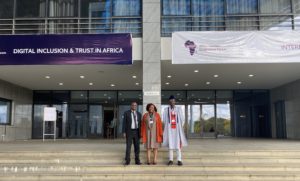 At the end of the forum, it was officially declared that:
At the end of the forum, it was officially declared that:
![]() The Internet is a key enabler and tool for human resilience and solidarity and as such it must be secured, accessible, available, and affordable.
The Internet is a key enabler and tool for human resilience and solidarity and as such it must be secured, accessible, available, and affordable.
![]() There is a significant digital divide and a human capacity gap in Africa; hence all stakeholders need to work together for digital inclusion, and improvement of livelihoods in Africa, with a key focus on marginalized and vulnerable groups.
There is a significant digital divide and a human capacity gap in Africa; hence all stakeholders need to work together for digital inclusion, and improvement of livelihoods in Africa, with a key focus on marginalized and vulnerable groups.
More so, the Forum’s commitment was to advocate for policies, legislation, and technical and economic measures that promote digital inclusion, affordability, accessibility, availability, and security.
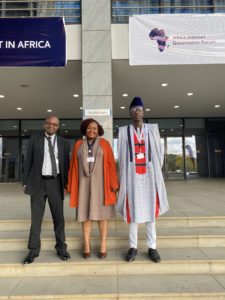 Furthermore, the Forum committed to actively participate in developing and adopting norms, regulations, policies, standards, and protocols within Africa for data protection, privacy, cyber security, and overall internet governance needed in Africa.
Furthermore, the Forum committed to actively participate in developing and adopting norms, regulations, policies, standards, and protocols within Africa for data protection, privacy, cyber security, and overall internet governance needed in Africa.
The outcome and declaration of the Forum have charted a pathway for libraries to strategically engage in advocacy, policy, and legislation that will enhance and promote inclusive digital affordability, accessibility, availability, and security that will foster equitable access to information for all on the continent.
We are grateful to IFLA’s representatives at the Forum for this report.